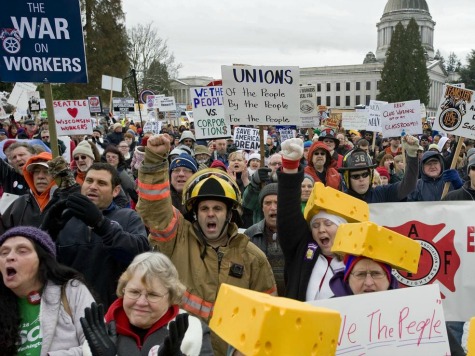
With President Obama safely re-elected to a second term, federal workers feel comfortable to make their demands known. As debate rages over lowering the federal deficit, they want a pay raise.
As CNN’s Money magazine reports:
[Union president Colleen M.] Kelley said her No. 1 issue right now is getting federal worker salaries unfrozen on Jan. 1, even if that means working out a deal later in the year and making pay hikes retroactive to Jan. 1.
In the midst of that, federal workers are also nervous about the fiscal cliff , which includes $1.2 trillion worth of spending cuts over a decade if Congress fails to act by Jan. 1. Some 277,000 workers — 14% of the federal work force — could lose their jobs in the next 12 months if the U.S. cannot avoid the cliff, according to a study by the Center for Regional Analysis at George Mason University.
A recent study by two scholars at the American Enterprise Institute and the Heritage Foundation showed that the average federal employee currently makes significantly more than their private sector counterparts. As the authors wrote in the Wall Street Journal this past April, two additional studies supported their analysis:
When the public pay debate began to simmer two years ago, we were among the few analysts to show that many public employees–federal, state and local, including public school teachers–are paid more than what their skills would merit in the private economy. Our core insight was that public-sector pensions are several times more generous than typical private-sector plans, but this generosity is obscured by accounting assumptions that allow governments to contribute far less to pension plans than private employers must…
The Congressional Budget Office endorsed a similar approach last month in a new report on federal employee compensation. The report–which congressional Democrats reportedly hoped would debunk our 2011 paper on federal pay–found that the federal retirement package of pensions plus retiree health care was 3.5 times more generous than private-sector plans, contributing to a 16% average federal compensation premium.
Even more recently, an analysis by two Bureau of Labor Statistics economists, published in the winter 2012 Journal of Economic Perspectives, concluded that the salary and current benefits of state and local government employees nationwide are 10% and 21% higher, respectively, than private-sector employees doing similar work. This study didn’t even factor in the market value of public-pension benefits, nor did it include the value of retiree health coverage.
With the political power of the Obama administration behind their demands, it now seems likely that federal pay increases will go into effect just as the private sector begins a new round of cutting wages and jobs.

COMMENTS
Please let us know if you're having issues with commenting.